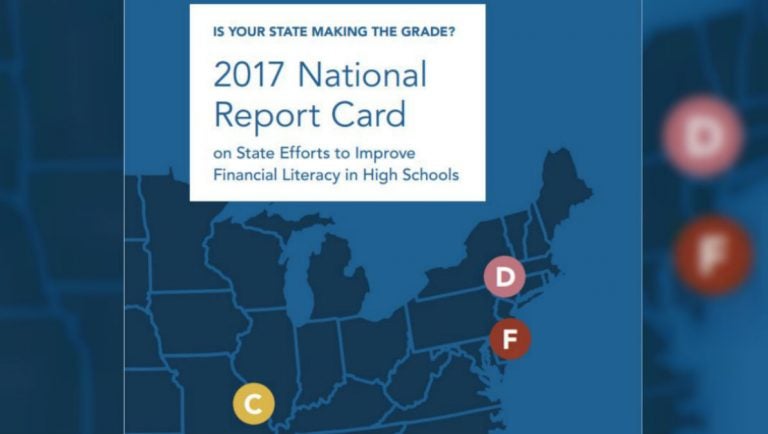Pennsylvania, Delaware high schools get an F for financial literacy classes

A Vermont college center gives Pennsylvania and Delaware a grade of F in efforts to teach financial literacy in their high schools. (Center for Financial Literacy)
Pennsylvania and Delaware are among nine states to receive a grade of F for teaching personal finance to high school students, according to a new national study.
The 2017 “report card” was released by the Champlain (Vt.) College Center for Financial Literacy, which also gave out state-by-state grades in 2015 and 2013.
Delaware also received an F in both previous reports.
Pennsylvania had an F in 2015 but received a D in 2013.
New Jersey scored a B all three years.
John Pelletier, the center’s director, said states that received failing grades have few requirements if any for personal finance education.
“This report card is about student access to personal finance education,” Pelletier said.
“If a state’s policies result in students having no opportunity to learn about this important subject in high school, then that deserves an F. And while some of these states have created programs that promote financial literacy education, they are not ensuring that all students are exposed to the subject.”
The study, titled “Is Your State Making the Grade? The 2017 Report Card on State Efforts to Improve Financial Literacy in High Schools,” grades every state and the District of Columbia, which also received an F. Others who failed were Alaska, California, Connecticut, Hawaii, Massachusetts, Rhode Island, South Dakota and Wisconsin.
Five states received an A — Alabama, Missouri, Tennessee, Utah and Virginia.
The center is a partnership among several financial institutions, non-profit entities and governmental agencies that promotes and develops financial literacy skills in K-12 students, college students, teachers and adults.
A state that gets an F, the study said, “has virtually no requirements for personal finance education in high school. Students in these states are able to graduate without ever having the opportunity to take a course that includes financial literacy instruction.”
While Delaware has been at the bottom of the pack in all three studies, it’s listed as a state that has made “slow but steady progress.”
The report said Delaware and Pennsylvania has created programs that promote financial literacy education, but Pelletier said students often still receive no exposure to the subject.
The report gave Delaware kudos for creating a “financial literacy task force that has recommended mandatory financial literacy education standards for grades K-12.” The state Department of Education will ask the state board to review and approve such a policy early next year, the report said. If that’s enacted, “Delaware could see a grade change from a Grade F to a Grade C in the future,’’ the report said.
Alison May, Delaware’s state education spokeswoman, said her office will present the proposal to the board Thursday, earlier than the Vermont center’s report had anticipated.
If approved, “the new standards will meet the needs they are identifying,” May said.
Officials at the Pennsylvania Department of Education did not respond to requests for comment.
Pelletier said studies show that financial literacy is linked to positive outcomes like wealth accumulation, stock market participation, retirement planning, and avoiding high-cost alternative financial services like payday lending and auto title loans.
WHYY is your source for fact-based, in-depth journalism and information. As a nonprofit organization, we rely on financial support from readers like you. Please give today.





